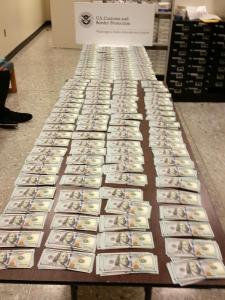Customs at Philadelphia seized nearly $100,000 cash that was hidden inside the traveler’s personal effects on his way to Doha, Qatar. Here’s the story, below:
U.S. Customs and Border Protection (CBP) officers seized more than $99,000 from a Palestine-bound U.S. family on Saturday at Philadelphia International Airport (PHL).
CBP officers conducted outbound enforcement operations on a Doha, Qatar-bound flight and encountered a man who verbally reported that he possessed $65,000. Officers provided a CBP form 503 to the traveler that explains federal currency reporting requirements, asked if he understood the law, and asked him to write down his currency amount on the form. The traveler wrote $65,000 and signed the form.
Officers then provided the traveler with an U.S. Treasury Department form (FINCEN 105) and the traveler documented that he possessed $65,000.
Officers initiated a baggage examination and discovered a total of $99,549 in the traveler’s pockets, in his jacket, and in two carry-on backpacks. Officers seized the currency, returned $5,000 for humanitarian purposes, and released the family.
CBP is not releasing the travelers’ names because none were criminally charged.
Has Philadelphia CBP seized your cash?
If Philadelphia CBP seized your cash, read our trusted customs money seizure legal guide and contact our customs lawyer for a free cash seizure consultation by clicking the contact buttons on this page.













